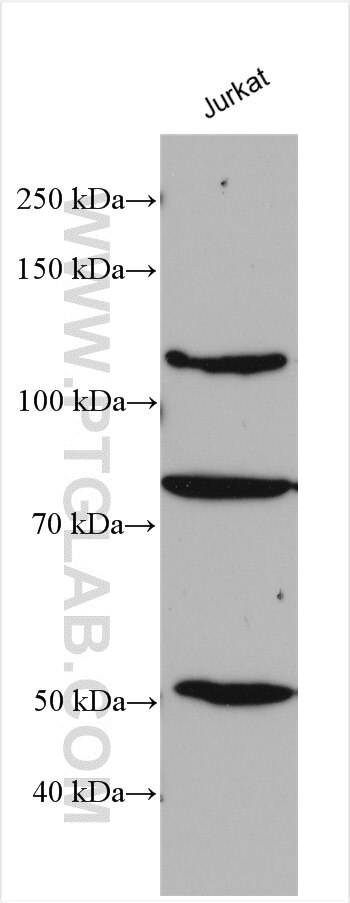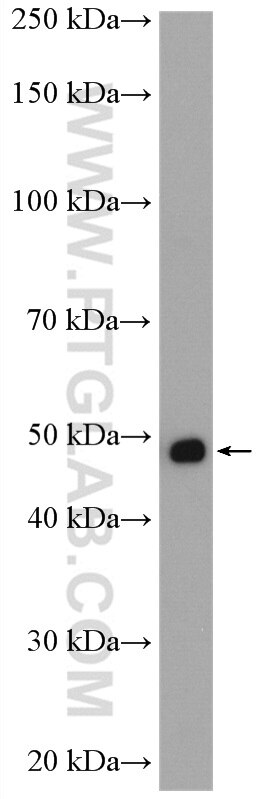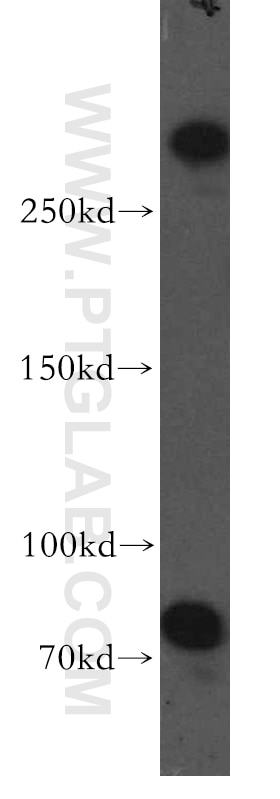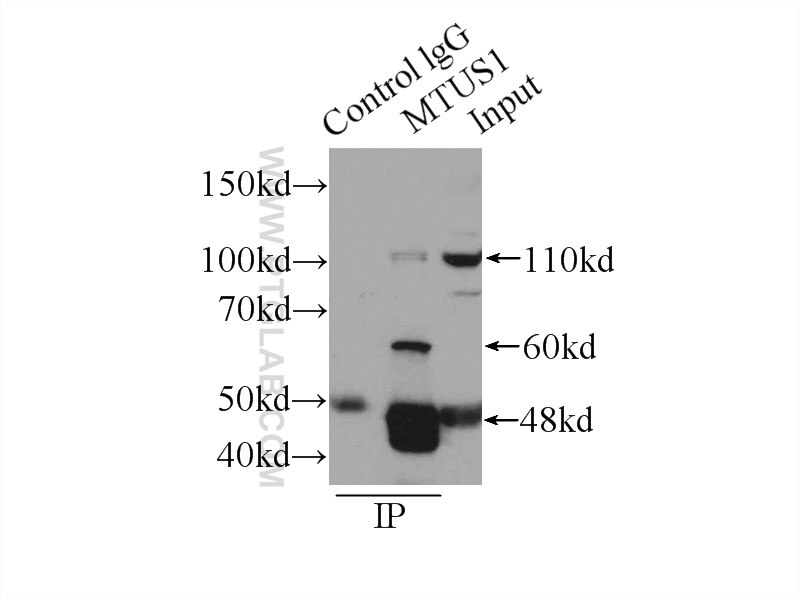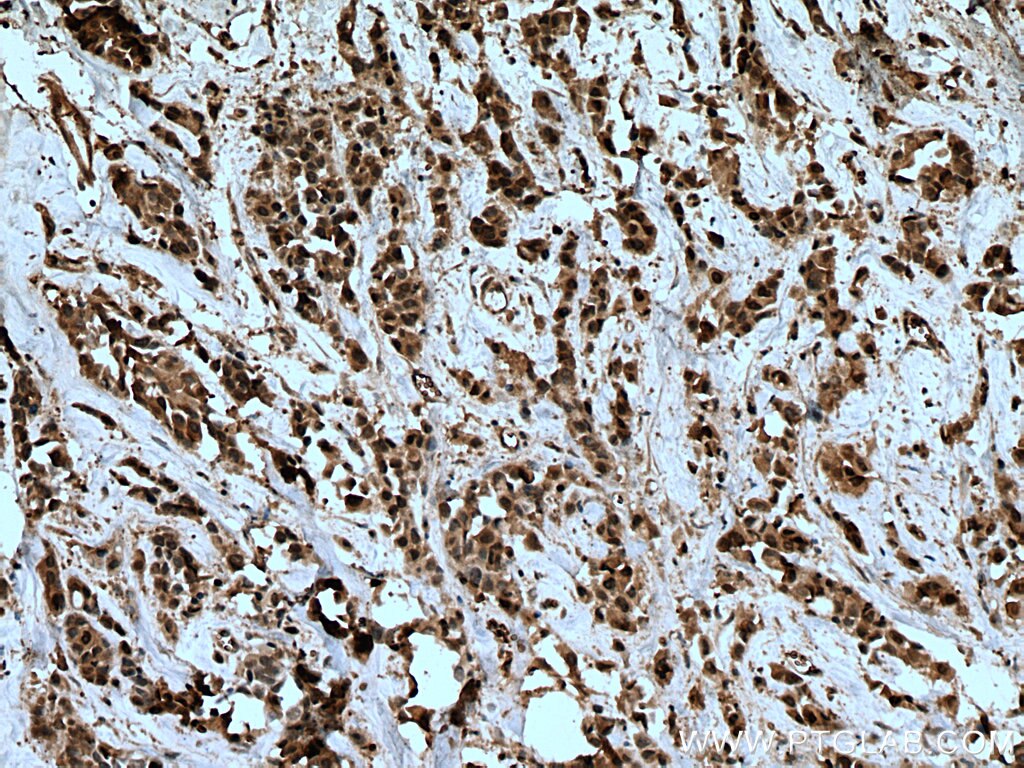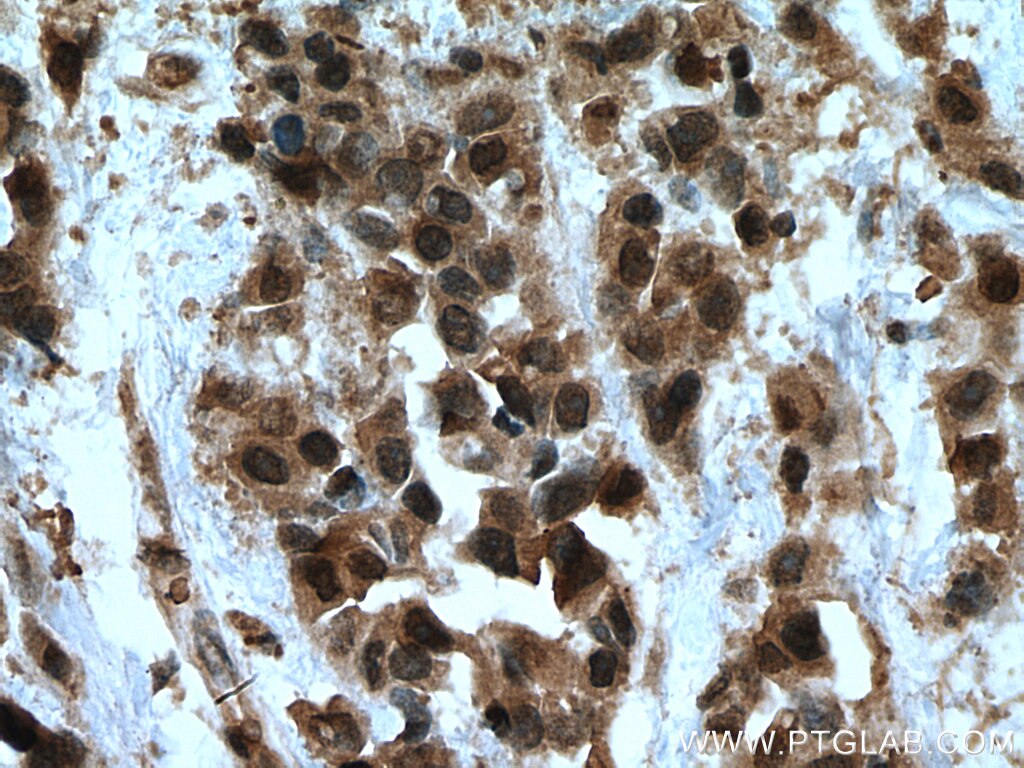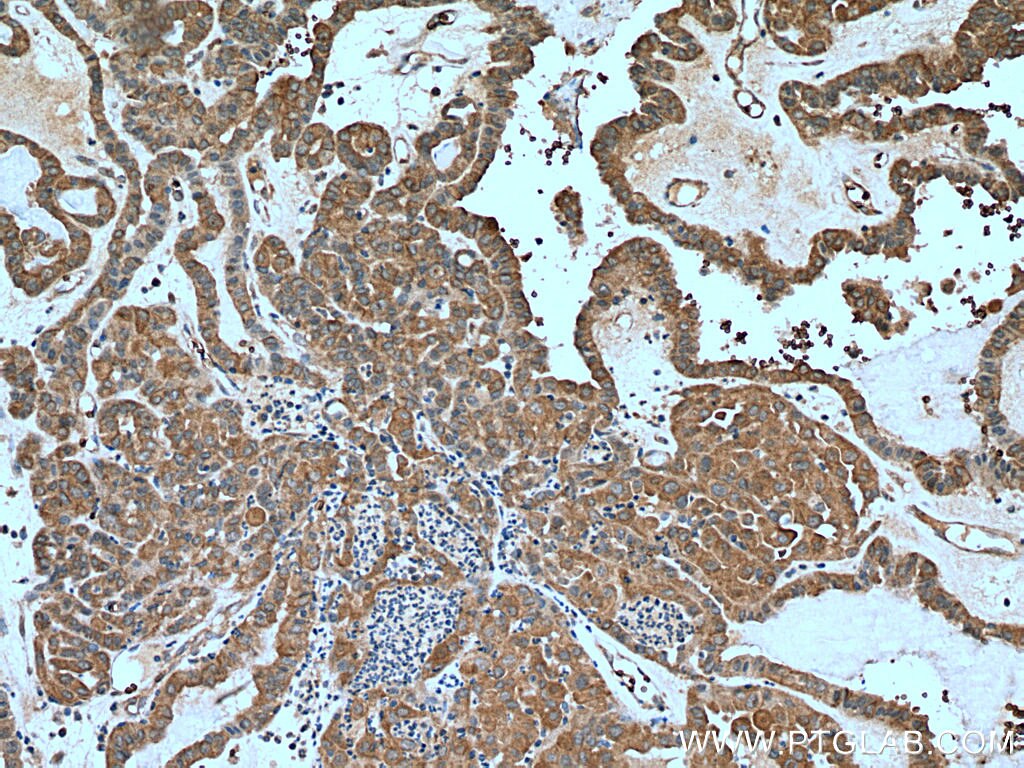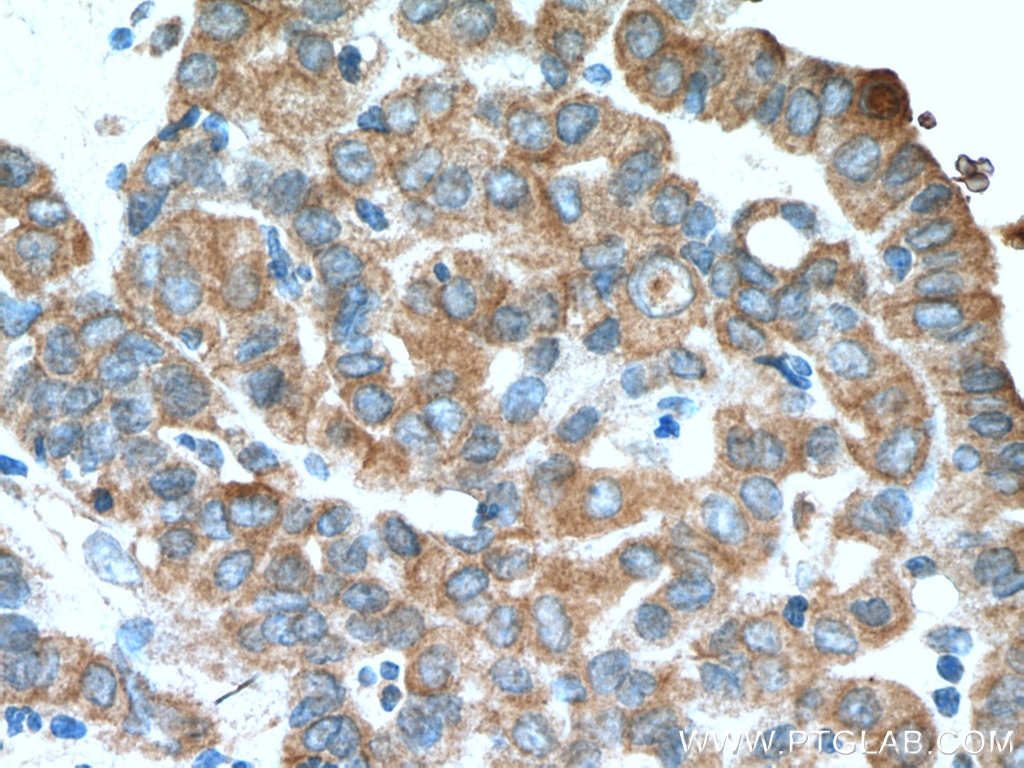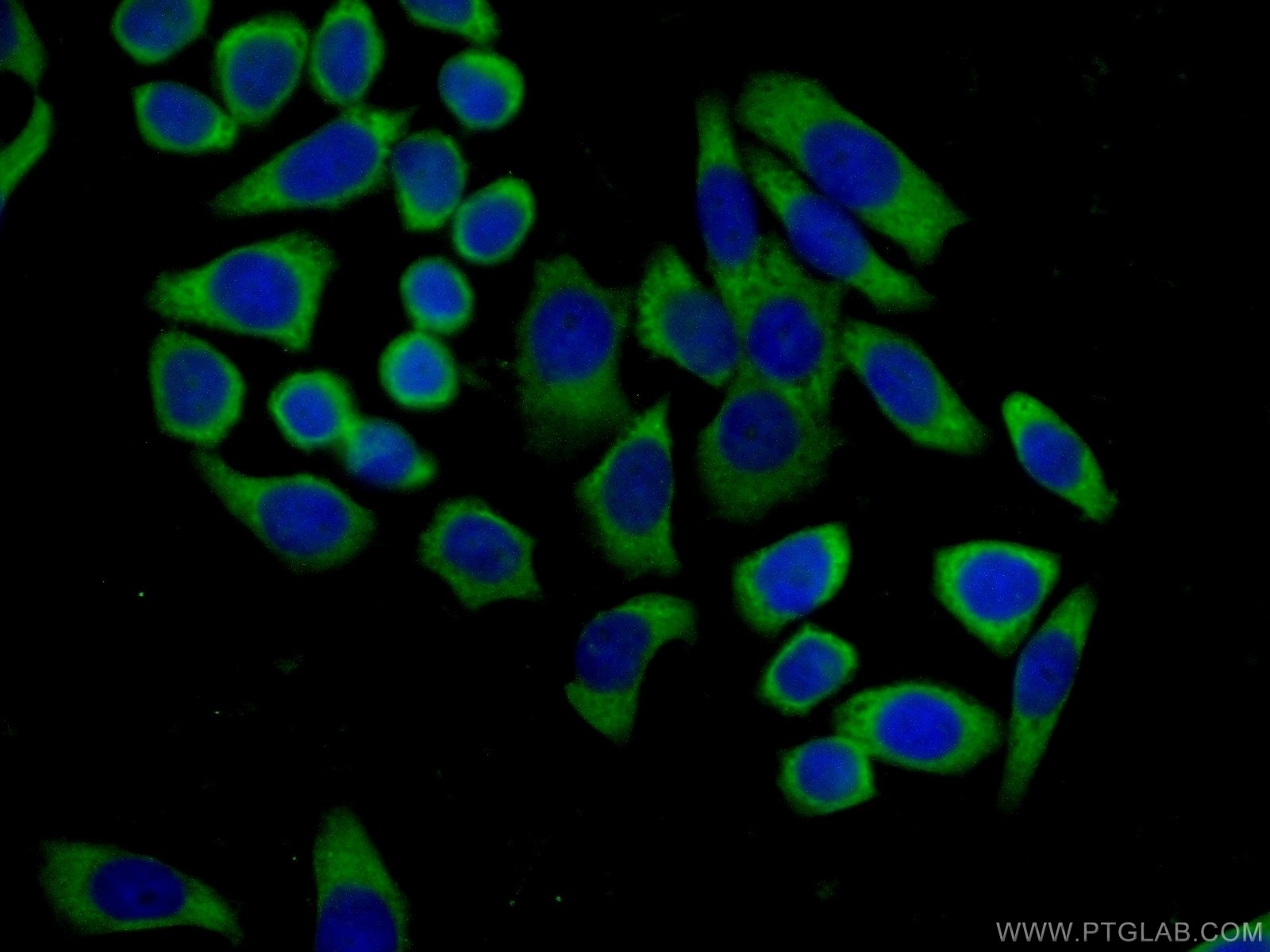Tested Applications
| Positive WB detected in | Jurkat cells, K-562 cells, human brain tissue, mouse brain tissue |
| Positive IP detected in | mouse brain tissue |
| Positive IHC detected in | human breast cancer tissue, human thyroid cancer tissue Note: suggested antigen retrieval with TE buffer pH 9.0; (*) Alternatively, antigen retrieval may be performed with citrate buffer pH 6.0 |
| Positive IF/ICC detected in | PC-3 cells |
Recommended dilution
| Application | Dilution |
|---|---|
| Western Blot (WB) | WB : 1:500-1:1000 |
| Immunoprecipitation (IP) | IP : 0.5-4.0 ug for 1.0-3.0 mg of total protein lysate |
| Immunohistochemistry (IHC) | IHC : 1:300-1:1200 |
| Immunofluorescence (IF)/ICC | IF/ICC : 1:20-1:200 |
| It is recommended that this reagent should be titrated in each testing system to obtain optimal results. | |
| Sample-dependent, Check data in validation data gallery. | |
Published Applications
| KD/KO | See 1 publications below |
| WB | See 5 publications below |
| IF | See 2 publications below |
| CoIP | See 1 publications below |
Product Information
13436-1-AP targets MTUS1 in WB, IHC, IF/ICC, IP, CoIP, ELISA applications and shows reactivity with human, mouse, rat samples.
| Tested Reactivity | human, mouse, rat |
| Cited Reactivity | human, mouse |
| Host / Isotype | Rabbit / IgG |
| Class | Polyclonal |
| Type | Antibody |
| Immunogen |
CatNo: Ag4242 Product name: Recombinant human MTUS1 protein Source: e coli.-derived, PGEX-4T Tag: GST Domain: 1-240 aa of BC033842 Sequence: MQLQEQFDNLNAAHETSKLEIEASHSEKLELLTKAYEASLSEIKKGHEIEKKSLEDLLSEKQESLEKQINDLKSENDALNEKLKSEEQKRRAREKANLKNPQIMYLEQELESLKAVLEIKNEKLHQQDIKLMKMEKLVDNNTALVDKLKRFQQENEELKARMDKHMAISRQLSTEQAVLQESLEKESKVNKRLSMENEELLWKLHNGDLCSPKRSPTSSAIPLQSPRNSGSFPSPSISPR Predict reactive species |
| Full Name | mitochondrial tumor suppressor 1 |
| Calculated Molecular Weight | 51 kDa, 141 kDa |
| Observed Molecular Weight | 40-48 kDa, 80 kDa, 110-120 kDa, 270-280 kDa |
| GenBank Accession Number | BC033842 |
| Gene Symbol | MTUS1 |
| Gene ID (NCBI) | 57509 |
| RRID | AB_10638619 |
| Conjugate | Unconjugated |
| Form | Liquid |
| Purification Method | Antigen affinity purification |
| UNIPROT ID | Q9ULD2 |
| Storage Buffer | PBS with 0.02% sodium azide and 50% glycerol, pH 7.3. |
| Storage Conditions | Store at -20°C. Stable for one year after shipment. Aliquoting is unnecessary for -20oC storage. 20ul sizes contain 0.1% BSA. |
Background Information
MTUS1, also named as ATBP, ATIP, GK1, KIAA1288 and MTSG1, Belongs to the MTUS1 family. It cooperates with AGTR2 to inhibit ERK2 activation and cell proliferation. MTUS1 may be required for AGTR2 cell surface expression. Together with PTPN6, induces UBE2V2 expression upon angiotensin-II stimulation. Isoform 1 inhibits breast cancer cell proliferation, delays the progression of mitosis by prolonging metaphase and reduces tumor growth. MTUS1 up-regulation during cellular transition from proliferation to quiescence and differentiation. It is a potential tumor suppressor gene located at chromosome 8p21.3.22, near marker D8S254. According to the functional data and intracellular localization, MTUS1 also named as mitochondrial tumor suppressor gene 1 (MTSG1). One main feature common to all ATIP members is the presence of a large C-terminal coiled-coil domain that allows homo- and hetero-dimerization of these proteins. (PMID:12692079, 15123706). The antibody can recognize all the isoforms expect isoform 5(85-90 kDa). The antibody tested HomoDimer isoforms (80kd/110-120/280kd) in Jurkat cell.
Protocols
| Product Specific Protocols | |
|---|---|
| IF protocol for MTUS1 antibody 13436-1-AP | Download protocol |
| IHC protocol for MTUS1 antibody 13436-1-AP | Download protocol |
| IP protocol for MTUS1 antibody 13436-1-AP | Download protocol |
| WB protocol for MTUS1 antibody 13436-1-AP | Download protocol |
| Standard Protocols | |
|---|---|
| Click here to view our Standard Protocols |
Publications
| Species | Application | Title |
|---|---|---|
Aging Cell Activation of angiotensin-converting enzyme 2/angiotensin (1-7)/mas receptor axis triggers autophagy and suppresses microglia proinflammatory polarization via forkhead box class O1 signaling | ||
FASEB J Microtubule associated tumor suppressor 1 interacts with mitofusins to regulate mitochondrial morphology in endothelial cells. | ||
J Mol Cell Cardiol MTUS1 silencing promotes E-selectin production through p38 MAPK-dependent CREB ubiquitination in endothelial cells.
| ||
Int J Med Sci Light Emitting Diodes Irradiation Regulates miRNA-877-3p to Promote Cardiomyocyte Proliferation. | ||
BMC Cancer FTO-mediated demethylation of MTUS1/ATIP1 promotes tumor progression in head and neck squamous cell carcinoma |

